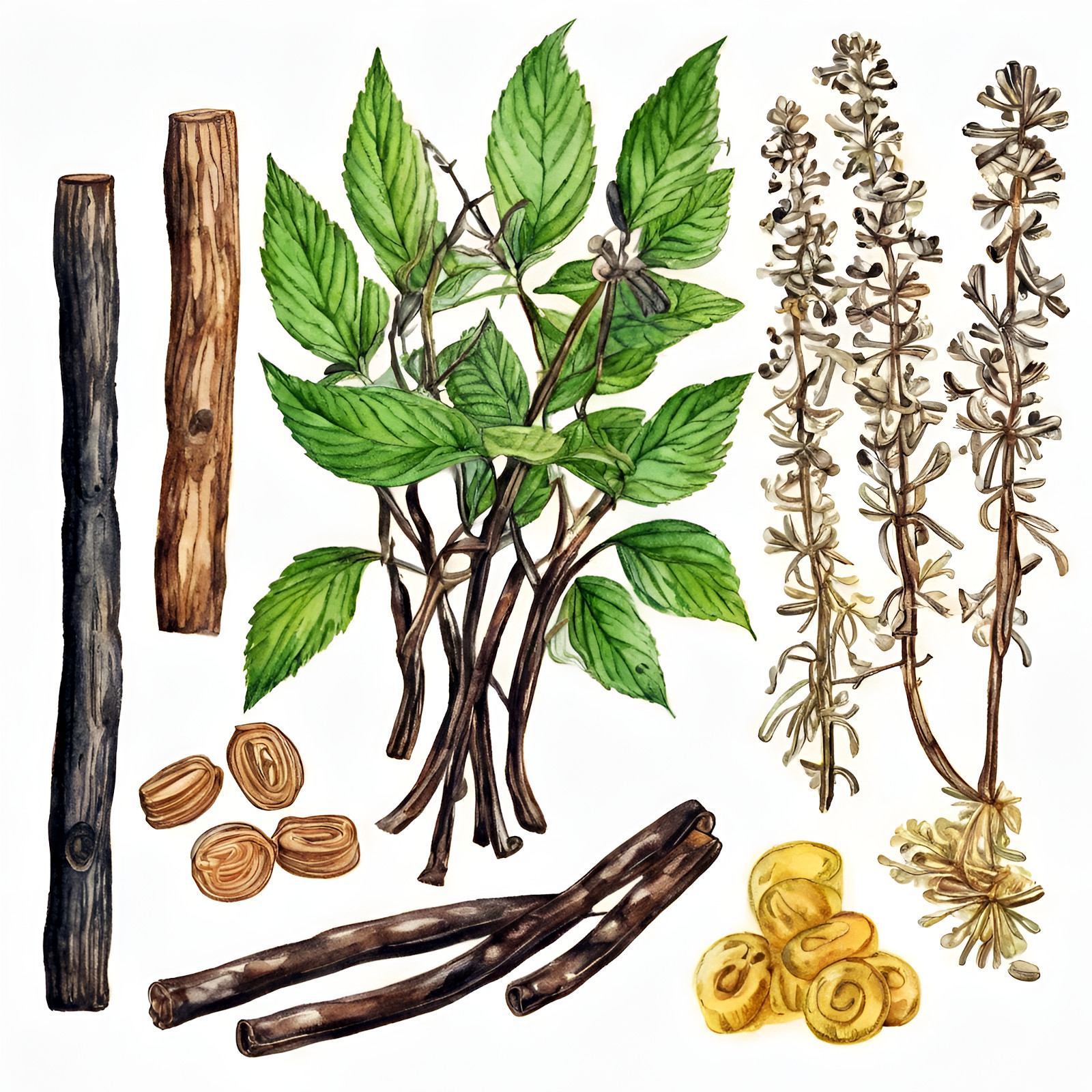Licorice is a sweet temptation with a rich history, and plays a significant role in many cultures, whether as a delicious treat or for its recognized healing properties. The following article attempts to shed light on the fascinating world of liquorice and to present its health aspects, its effects as well as the potential risks as an overview.
This article is about creating awareness that licorice is more than a candy. Licorice has properties of an effective drug and can therefore also cause great harm if overconsumed. In no way can this article replace medical advice. So if you have acute symptoms, consult a doctor or therapist.
Basics of licorice
What is licorice?
The root of the plant Glycyrrhiza glabra, known as licorice, has been a valued sweetener and remedy in traditional medicine for thousands of years. Originating in Europe and Asia, this plant has the sweetener glycyrrhizin, which has an extraordinary sweetening power – up to 50 times sweeter than conventional sugar.
Ingredients and Historical Uses
In addition to glycyrrhizin, licorice root is rich in flavonoids and minerals. In the past, it has been used to relieve coughs, treat stomach ailments, and promote liver health. Their extensive use in the history of medicine testifies to their versatility and effectiveness.
Manufacturing and global distribution
The extraction of liquorice root and its processing into the confectionery we know is a traditional process that has developed over centuries. Today, licorice is common around the world in various forms and flavors, highlighting its global popularity.
Health Benefits
Digestion support
Licorice shows promising effects in the treatment of various digestive disorders. Its anti-inflammatory properties can protect the gastric mucosa, thus helping to alleviate discomfort. In the meantime, the traditionally handed down effect has also been confirmed by studies. If you have mild complaints, you can therefore consider licorice as a home remedy.
Relief of menopausal symptoms
The positive effect of licorice on menopausal symptoms, especially hot flashes, is another example of its multiple health benefits of licorice as a home remedy. Research suggests that licorice may play a beneficial, supportive role in the natural treatment of these symptoms.
Other Health Benefits
In addition to aiding digestion and relieving menopausal discomfort, licorice is also believed to have a positive effect on other aspects of health, including immune system support and anti-inflammatory properties. Always keep in mind that one-sided and excessive consumption of everything quickly leads to negative effects and consequences. The rule applies especially here: the dose makes the poison.
Potential Risks and Side Effects
Blood pressure and heart health
Despite its benefits, excessive licorice consumption can lead to increased blood pressure and other cardiovascular problems, for example due to the ingredient glycyrrhizin. Moderate consumption is therefore essential for health.
Drug interactions
The interaction of licorice with certain medications can also affect their effectiveness, which requires special caution when taking medication regularly. Therefore, it is important for liquorice consumers to carefully study the package inserts of their medically prescribed medications and to inform treating physicians about liquorice consumption.
Long-term effects
Long-term high intake of licorice can lead to other health problems, including electrolyte imbalance and hypokalemia, highlighting the importance of conscious consumption.
Liquorice with salmiac
Unique taste
Licorice with salmiac, a combination that is particularly appreciated in the countries of Northern Europe, is characterized by its unique, salty-tart taste. Salmiac, also known as ammonium chloride, offers an intense taste experience that is often sought after by licorice lovers. This special liquorice variant combines the sweetness of traditional liquorice with the piquant spiciness of salmiak to create an unmistakable pleasure.
Health aspects
Apart from the unmistakable taste, salmiak also has effects on our body. For example, many types of salmiac lozenges (“salmis”) and salmiak liquorice candies can be found in German pharmacies, which are given to patients without a prescription.
The mildly expectorant properties of salmiac can be found to be supportive, especially during the cold season, by making it easier to cough up. In addition, stimulating saliva production can have a beneficial effect on dryness in the oral cavity, making salmiak licorice a popular choice.
Moderate Consumption of Salmiak Licorice
While the positive effects of salmiak licorice underline its popularity, moderate consumption is advisable. Excessive intake of ammonium chloride can lead to undesirable side effects such as high blood pressure. Therefore, the same applies to this liquorice variant: enjoy in moderation. This ensures that lovers of the special taste of salmiak licorice can enjoy the benefits without incurring any health risks.
Deglycyrrhizinated Liquorice (DGL)
Differences from conventional liquorice
DGL licorice, which does not contain glycyrrhizin, offers a safe alternative for people who want to enjoy the health benefits of licorice without the risks involved. It is particularly suitable for long-term use.
Advantages and applications
DGL is often used to relieve digestive problems and can be consumed without the side effects typical of conventional licorice.
Consuming licorice safely
Correct dosage
The right dosage of licorice is crucial to enjoy its benefits without taking any health risks. Moderate intake is recommended. Especially those with a sweet tooth can find it difficult to correctly assess liquorice, which fills entire supermarket shelves as a sweet, and there are known cases in which excessive liquorice consumption has had serious health consequences up to and including death.
Special precautions for pre-existing conditions
People with pre-existing conditions, especially those with heart and blood pressure problems, should seek medical advice before consuming licorice. Since liquorice interferes with the potassium balance and can thus severely disrupt the metabolism, people with regular liquorice consumption should also be particularly attentive to health problems.
Conclusion
Licorice is much more than just a candy. It is a plant with deep-rooted cultural and medicinal significance. Conscious and moderate consumption makes it possible to enjoy the health benefits of licorice while minimizing potential risks. A balanced approach to licorice consumption is the key to healthy enjoyment.
